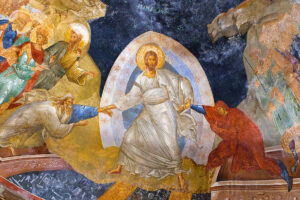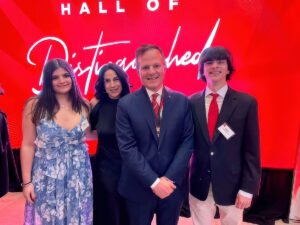Speech on the occasion of the glorious celebration of the memory of the Three Hierarchs at the Phanar
The memory of the Three Hierarchs and “Defenders of the Letters” was honored with great splendor in the sacred cathedral of the Church of Constantinople. In his speech, the Ecumenical Patriarch referred in particular to the importance they have for education today, addressing its problems and highlighting its prospects.
“Continued reforms, upheavals and dead ends in pedagogy and education reflect the crisis of global society. Valuable traditions and humanitarian achievements are shaken or dismantled. Education seems to be uninterested in the development of the spiritual nature of man, and turns him unilaterally toward his individual needs, toward himself, his self-realization and prosperity, and not to the common good, leading him to what is temporal and ephemeral and not to what is crucial and essential, to endless claims of rights, and not to equity, ethics and service. This is often the goal of the many educational reforms, whose advocates, unfortunately, are unaware that the so-called pragmatic role of education cannot possibly thrive if its humanistic, cultural, liberating and humanitarian function is marginalized.
“It is self-evident that in this time of revaluation, the diminishment of social morality, the dominance of utilitarianism, and the identification of cultural development with technological and economic progress, we need a culture of freedom and responsibility, which will draw on its most precious traditions of spiritual culture in a steady pedagogical direction and value orientation.
“From ancient Greek wisdom, which the Three Hierarchs thoroughly studied and understood, comes the view of education as the ‘journey of the soul’ to the good (Plato, Republic, 518d). The Greek genius also taught that true education is not that which enables us to acquire what we want, but that which teaches us to desire what we should, the right, our true ‘interest,’ which is always connected with the turn of our life towards the Truth, to ‘well-being,’ which, of course, has no relation to wealth and materialism, but is identical to living according to ‘reason’ and ‘virtue.’”
The Ecumenical Patriarch made special reference to the spiritual treasure of the Three Hierarchs.
“The treasure of the Three Hierarchs for education is the so-called ‘culture of the person.’ A person-centered culture is resistance to any form of objectification of the human person, either in the name of progress in science and technology, or in the name of economic development, but also in the name of individualism, religious and cosmic collectivism, and other fundamentalisms. The culture of the person is education in freedom and responsibility, with the school as a place for the transmission of high values, the ‘teacher’s ethos’ and ‘the asceticism of apprenticeship.’ The Hierarchs here introduce into the field of education the importance of personal commitment and total dedication. The teacher is more than a professional educator and ‘facilitator of learning.’ The learner is more than just a ‘trainee’ who is only interested in what, in his own opinion, is important and useful. The ‘faculty of the person’ is not just a ‘school,’ but a place of ‘learning,’ freedom and solidarity, a college, and a society of life. It is rightly written that, ‘according to the etymology of the term “school,” we “teach” when we go to school, not when we leave.’ Unfortunately, in our times, the application of economic criteria to the organization of education gradually leads to the loss of its humanistic orientation. The conversion of the terms ‘school,’ ‘teacher’ and ‘student’ into economic categories expresses the spirit of the times, but not the truth about these precious elements of the authentic tradition of education. No constructive solution can be given to the area of education solely on the basis of economic and organizational criteria. Obviously, in the tradition of Orthodox Christianity, there are no ready answers and solutions to all the contemporary problems of education. There are, however, basic principles, theological criteria and fundamental values, on the basis of which, in parallel study and knowledge of contemporary problems, it is possible to find solutions and to provide directions out of the crisis. These vital ancient truths, which are at the center of the teaching of the Three Hierarchs and belong to the core of our identity, not only have not lost their value, but they appear to be gaining a new timeliness today, in view of the new dangers to the dignity of mankind, and the overriding duty that all of us have, to fight for its salvation.”
In concluding his speech, His All-Holiness stressed the importance of the timeless presence of the spiritual discourse and the teaching of the Fathers of the Church in our lives.
“As there was no yesterday and there is no present for our Orthodox people which is not connected with the spirit and the ethos of the Fathers of the Church, we cannot imagine the future without them, without the inherent proposition of life and freedom, without the idea of education, which they imparted to generations of the Orthodox. The great theologian of the 20th century, Father Georges Florovsky, the 40th anniversary of whose death is this year, calls the Fathers and their teaching the ‘permanent logical category of the Christian faith, a firm and absolute measure and criterion’ [G. Florovsky, ‘Patristic Theology and the Ethos of the Orthodox Church,’ in Issues of Ecclesiastical History (Thessaloniki 1979), 17]. Creative engagement with the Fathers, with these teachers and witnesses of true freedom, is a source of existential renewal, theological wisdom, and spiritual regeneration. The spirit of the Fathers is today a protection against the self-centered, consumerist, technocratic, and economically-centered culture. It is an alternative proposition for life against a way of life that does not impart life, does not know the ‘Glory to You, O God’ and the Eucharistic ethos, and disregards and destroys the natural environment. The Fathers teach self-denial, self-sacrifice and brotherhood, the abandonment of one’s ‘rights,’ of the ‘ego,’ in the name of love of one’s brother. We are reminded that the exaltation of the Ego is not freedom, but a contraction of morality and loss of liberty, according to Paul the Apostle, who proclaims: If I have no love I am ‘nothing’ (1 Cor. 15:3). Continuous engagement with ourselves not only does not solve existential problems, but multiplies existing one and creates new ones.
“In the tradition of the Fathers, freedom as love has been enshrined as the highest ethos. As it has been written, ‘no movement has combined the offer of meaning and truth with freedom, nowhere have the mind and heart, faith and knowledge, freedom and love, the soul and the body, the man and the woman, man and society, nature and history, spirit and matter, heaven and earth, been so fully reconciled as in the life of Orthodoxy.’ This Orthodoxy is represented and expressed above all by the honored Hierarchs and Teachers, who have promoted the love of God and the love of man, in their essence, as the pillar of Christian existence. They are the preachers of freedom in Christ, which is nourished by faith in Christ, lived through the working life of the Church, and is witnessed as love and as a contribution to the transformation of society and the world in Christ.”
The Ecumenical Patriarch addressed the Mayor of Athens, Athanasios Angelidis, President of the Ecumenical Patriarchate’s Great School of the Nation.
Earlier, the Ecumenical Patriarch celebrated the Divine Liturgy at the Patriarchal Church of St. George; co-celebrants were the Metropolitans Apostolos, Geron of Derkon; Dimitrios, Geron of the Prince Islands, Germanos of Tranoupolis, Meliton of Philadelphia; Irenaios of Myriofytos and Peristasis; Chrysostomos of Myra; Theoleptos of Ikonion; Stefanos of Kallioupolis and Madytos; Elpidophoros of Bursa; Athenagoras of Kydonies; Maximos of Selyvria; Bartholomaios of Smyrna; and the priest Archimandrite Vissarion.
The Archbishop Tychon, Dean of the Holy Patriarchal and Stavropygian Stavronikita Monastery of Mount Athos, gave the farewell speech of the day.
At the end of the Divine Liturgy, the Ecumenical Patriarch prayed, as he does every year, the Trisagion for the repose of the souls of the eminent founders, benefactors, administrators, scholars, instructors, teachers, curators and students of the Great School.






